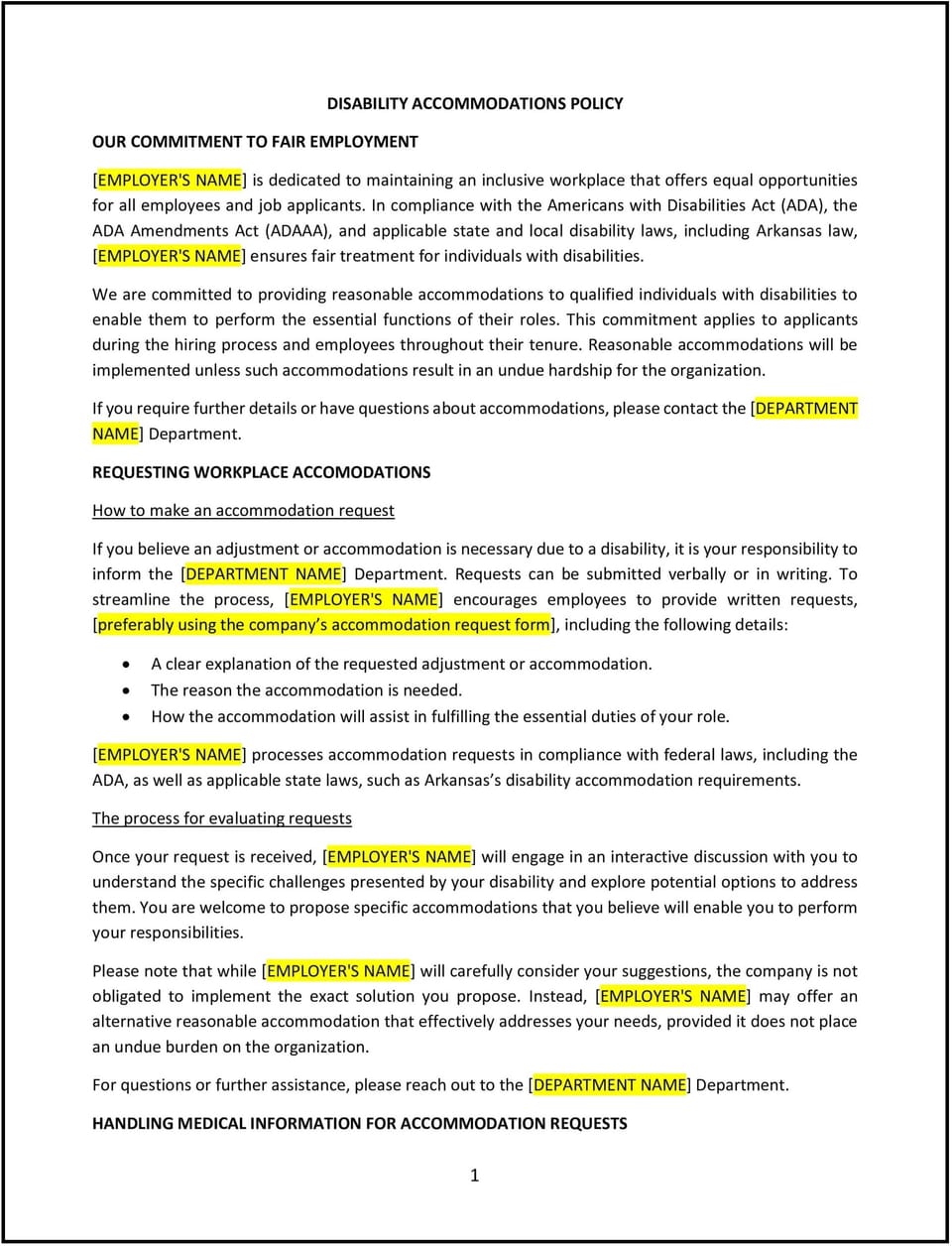Disability accommodations policy (Arkansas): Free template

Disability accommodations policy (Arkansas)
In Arkansas, a disability accommodations policy provides businesses with clear guidelines for supporting employees with disabilities. This policy ensures compliance with the Americans with Disabilities Act (ADA) and Arkansas-specific regulations while fostering an inclusive and equitable workplace.
This policy outlines the process for requesting accommodations, the business’s responsibilities in evaluating and implementing requests, and the rights of employees. By implementing this policy, Arkansas businesses can promote inclusivity, enhance employee satisfaction, and support compliance with legal obligations.
How to use this disability accommodations policy (Arkansas)
- Define reasonable accommodations: Clearly specify the types of accommodations the business may provide, such as modified workstations, flexible schedules, or assistive technologies.
- Establish request procedures: Outline how employees can request accommodations, including required documentation and points of contact, such as HR or management.
- Evaluate requests promptly: Implement a process for assessing accommodation requests in a timely manner, engaging in an interactive dialogue with the employee to determine feasible solutions.
- Maintain confidentiality: Ensure that all information related to disability and accommodation requests is handled discreetly and securely.
- Monitor effectiveness: Regularly review the accommodations provided to ensure they continue to meet the employee’s needs and support their job performance.
Benefits of using this disability accommodations policy (Arkansas)
This policy offers several advantages for Arkansas businesses:
- Promotes inclusivity: Supports a diverse workforce by ensuring employees with disabilities can perform their roles effectively and comfortably.
- Enhances employee retention: Demonstrates the business’s commitment to supporting employees, fostering loyalty and reducing turnover.
- Reduces legal risks: Ensures compliance with the ADA and Arkansas disability laws, minimizing the risk of complaints or lawsuits.
- Improves workplace morale: Creates a supportive and equitable environment that values and respects all employees.
- Supports compliance: Aligns with Arkansas-specific regulations and federal laws, ensuring the business meets its legal obligations.
Tips for using this disability accommodations policy (Arkansas)
- Address Arkansas-specific considerations: Include any state-specific laws or guidelines related to disability accommodations in the workplace.
- Train managers: Provide training to supervisors and HR staff on handling accommodation requests sensitively and in compliance with the policy.
- Encourage open communication: Create an environment where employees feel comfortable discussing their needs without fear of judgment or retaliation.
- Document all requests: Maintain records of accommodation requests, evaluations, and outcomes to support transparency and legal compliance.
- Review regularly: Update the policy to reflect changes in disability laws, workplace practices, or employee needs.
Q: How does this policy benefit the business?
A: This policy fosters an inclusive workplace, enhances employee satisfaction, and ensures compliance with Arkansas and federal disability laws, reducing legal risks.
Q: What types of accommodations might the business provide?
A: The business may provide accommodations such as modified workstations, accessible technologies, flexible schedules, or adjustments to job responsibilities to support employees with disabilities.
Q: How does this policy support compliance with Arkansas laws?
A: The policy aligns with Arkansas-specific regulations and the ADA, ensuring the business meets legal requirements while supporting employees equitably.
Q: What steps should the business take to handle accommodation requests?
A: The business should engage in an interactive process with the employee, assess the request, implement reasonable solutions, and monitor the accommodation’s effectiveness.
Q: How can the business ensure confidentiality in handling disability information?
A: The business should restrict access to sensitive information to authorized personnel, store records securely, and communicate accommodations discreetly to maintain employee privacy.
This article contains general legal information and does not contain legal advice. Cobrief is not a law firm or a substitute for an attorney or law firm. The law is complex and changes often. For legal advice, please ask a lawyer.


